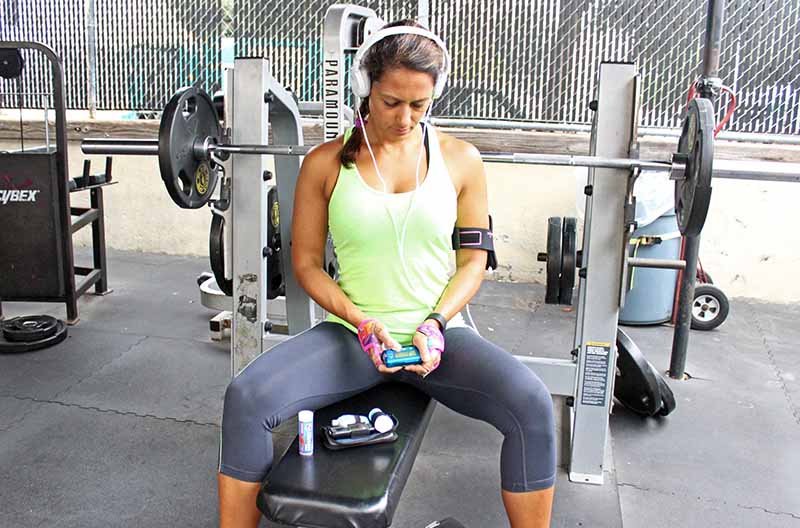Today, I want to talk to you about some of the biggest myths and misconceptions about diabetes.
I am not talking about the misconceptions that non-diabetics often have about diabetes (even though those can be serious as well), but about the diabetes myths about food and fitness that newly diagnosed or even experienced diabetics that I meet believe.

The reason why I want to talk about diabetes myths is that I hate seeing some of these myths discourage people living with diabetes from exercising, eating well, and living full and healthy lives.
Obviously, there are way more than three fitness and diabetes myths, but let’s keep it short and sweet.
Diabetes myth 1 – People living with diabetes need to eat “special” diabetes food
This myth is, in my opinion, both the most serious and the most annoying one since, for some reason, it makes random people think they need to police what I eat.
The truth is that there is no real difference between what is a healthy diet for a person with diabetes and a healthy diet for a non-diabetic. As long as you adjust your insulin accordingly, you can eat the same food as everyone else.
It’s true that eating a somewhat restrictive diet can sometimes make your diabetes management easier, but it isn’t necessarily healthier!

I choose to eat a balanced diet of carbs, fats, and protein, which is actually in line with the general health recommendations for non-diabetics. I also choose to eat primarily low glycemic carbs in order to keep my blood sugars from spiking, and because it fits with my fitness goals. I do sometimes go out for a burger, cake, or other treat, and I bolus for that. The key, in my opinion, is eating according to your lifestyle and goals and learning how to count carbs.
You can read more about my experiments with different amounts of carbs in my diet in this post. I have also posted an example of my Fit Diabetic Meal Plan where you can see what I typically eat in a day and learn how to calculate your daily calorie needs.
Diabetes myth 2 – Exercising makes it harder to manage your diabetes
I have actually heard this from a lot of people with diabetes, and have even read it on prominent diabetes blogs! It always makes me sad to see people believing this myth, because the truth is exactly the opposite. Exercise makes it easier to manage your diabetes in the long term!
It’s true that when you start working out, it can be hard to find the right balance between food, insulin, and exercise, and you may have more blood sugar lows than normal in the beginning, but you can learn to reduce or even eliminate those. When you do, the increased insulin sensitivity from working out will allow you to take less insulin, making your diabetes management a lot easier (my A1C is 6.1 now, something that was unthinkable before I started getting serious about fitness. I also have fewer lows).

While people do react differently to working out, there are some common physiological reactions that apply to most, if not all, people living with diabetes. Most people will see their blood sugar decline during steady-state cardio, while it may increase during more intense workouts (like resistance training or CrossFit). So the trick is to determine how, and how much, different types of exercise impact your insulin sensitivity during and after a workout, and then adjust your food and insulin accordingly to avoid low or high blood sugars.
I always keep a journal whenever I start a new meal plan or exercise regime simply to help me figure out my patterns. It can be annoying and take quite a bit of time, but I’d rather invest the time upfront than let my diabetes interfere with my life.
Diabetes myth 3 – If you take insulin you can’t lose weight
So let’s just put an end to this myth once and for all. Weight management has way more to do with what and how much you eat than how much insulin you take.
If you are in a calorie deficit and bolus correctly for your meals, you will lose weight, assuming you have no other health issues. If you eat more than you need to sustain your weight and bolus for that, then you will gain weight.

What can make it a little more challenging for people with diabetes is that we need to work out the right amount of insulin to take. If you’re constantly chasing your blood sugars, over-bolusing, and then eating to correct (aka feeding the insulin), you will most likely have a harder time losing weight.
So having diabetes can make it harder to lose weight because we don’t always get our calculations right and have to eat more to compensate, but it definitely doesn’t make it impossible!

paul thorsgaard
Totally agree! I have always believed that, especially myth 1.
Mark Dennis
I’ve been type1diabetic for 47 years, I say active as a union tradesmen, I would actually like to gain 15 pounds or so , can’t seem to gain weight. I’m 59 years old.
Tobias Oerum
Hi Mark, have you read Ben Tzeel’s post about building muscle? It’s a great place to start if you want to gain (muscle) weight: https://diabetesstrong.com/gaining-muscle-with-type-1-diabetes-an-intro-guide/
Lynn Gerard
Thank you for this information. I’d like to share it with my ex-mother in law as she thinks she was an expert even though she is not diabetic.